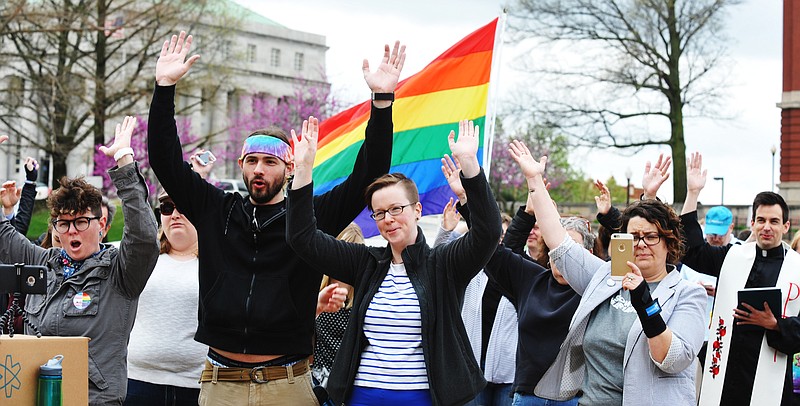Bruce Springsteen canceled an April 10 concert in Greensboro, North Carolina, because that state passed a law that limits anti-discrimination policies for lesbian, gay and transgender people.
Business executives want Gov. Pat McCrory and North Carolina legislators to repeal that law, and similar complaints are being made about a similar Mississippi law.
The Missouri Chamber of Commerce and Industry is among business groups worried about similar troubles if Missouri voters later this year adopt a proposed “religious liberty†amendment to the state Constitution.
“The Missouri Chamber cannot ignore the detrimental impact this would have on our state’s economy,†the organization explained earlier this month.
State Sen. Bob Onder, R-Lake St. Louis, sponsored the resolution proposing the amendment, which cleared the Senate last month — only after supporters broke a 39-hour filibuster and forced a vote on the issue.
House approval would send the issue to a statewide ballot.
If voters approve the amendment, the Constitution would prohibit the government from imposing a penalty on any religious organization that acts in accordance with a “sincere religious belief†concerning same-sex marriage, and either refuses to perform a same-sex marriage ceremony or allow that ceremony to be performed on its property.
The amendment also would prohibit the state from penalizing an individual who declines to provide goods of “expressional or artistic creation†— such as a floral arrangement or a cake — for a same-sex wedding or wedding reception.
Opponents argue the proposal would allow religious organizations and individuals to discriminate against people because of their sexual orientation.
And they point to other states — especially Indiana — that experienced financial troubles after passing similar proposals.
“Anti-LGBT legislation of this nature also poses a serious danger to our state’s reputation, economic vitality and future growth,†the group Visit KC argued in a statement. “(It) is discriminatory, bad for business and bad for Missouri’s economy."
At a March 18 St. Louis news conference with Gov. Jay Nixon, the St. Louis Regional Chamber said, “We respect the right of all individuals to exercise their religious beliefs as enshrined in the U.S. and Missouri Constitutions.
“However, we are concerned that some provisions of (the proposed amendment) are directly counter to our Missouri values and will have significant negative economic effects on our state.â€
State Sen. Mike Kehoe, R-Jefferson City — who also is the majority floor leader, responsible for scheduling debates on all bills after they’ve cleared Senate committees — told reporters, “I believe there are a couple of businesses that have unfounded beliefs of what this bill may, or may not, do to them, that have ginned everybody else up.
“I do not believe that (the proposed amendment), in its current form, will cause economic Armageddon to the state.â€
Onder followed Kehoe and went further.
“These predictions of economic Armageddon are nonsense,†he told reporters.
For starters, he said, his proposal is not a ‘RIFRA,†or “Religious Freedom Restoration Act.â€
“There’s a federal RIFRA,†Onder explained. “There are about 30 states that have RIFRAs to protect any and all religious beliefs.
“And they impose a very high burden on government to prove that that accommodation is being made, and that any restriction on religious liberty is done by the least-restrictive means.â€
But, he added, the proposed amendment to Missouri’s Constitution “focuses on a very particular belief that is under attack, in light of the Obergefell decision of the U.S. Supreme Court last June — which is the belief about marriage.â€
Visit Indy, an Indianapolis group promoting tourism, reported that a dozen conventions decided to go to other cities, citing Indiana’s religious-objections law as part of their reason — costing Indianapolis at least $60 million in hotel profits, tax revenues and other economic benefits.
And Indiana’s governor, Mike Pence, last signed a watered-down version of a religious-objections bill following an outpouring of business opposition.
But, Onder told reporters earlier this month, “The Pacific Institute recently rated Indiana — even in light of all the controversy that occurred … over their RIFRA and the RIFRA revision and all of that — the number one state in the United States for small business.â€
Kehoe added, “Comparing our legislation to other states that have something different, I don’t believe is comparing apples to apples.â€
In its statement against the proposed amendment, the Visit KC group argued, “Kansas City’s hospitality community will not tolerate anti-LGBT legislation. We urge our peer organizations and hometown corporations to come forward, unite and boldly assert: discrimination of any kind will not stand in Kansas City.â€
The St. Louis Regional Chamber added, “In the global competition for talent, the success of our companies is heavily based on our ability to attract and retain the best and most diverse group of highly skilled employees, regardless of religion, race, gender or sexual orientation.â€
And the Missouri Chamber of Commerce and Industry said, “We oppose adding a constitutional protection for employees who refuse to do their jobs.â€
The state said it had worked, unsuccessfully, “to protect employers from the increased litigation this resolution may cause (and to add) amendments that would have removed the business community from the effects of the resolution.â€
Onder said, “I think there is a certain amount of cultural cronyism and political correctness driven by one or two large businesses in this state, and I think it’s unfortunate. … My bill has absolutely nothing to do with their business.â€
And, he said, “Missourians ought to be given the right to vote on religious liberty.â€
Not all Missouri businesses have opposed the proposed amendment.
For instance, Ray McCarty, president and CEO of Associated Industries of Missouri, told the News Tribune: “We have reviewed the language of (the proposal) and discussed the resolution, and decided not to take a position.â€
And NFIB-Missouri, which represents small businesses, has taken no position.
For more local business coverage, read the full April 25, 2016, issue of #jcmo Inside Business.
Related articles:
Michael Sam slams Missouri religious objections bill
Missouri businesses join against religious-objection measure


